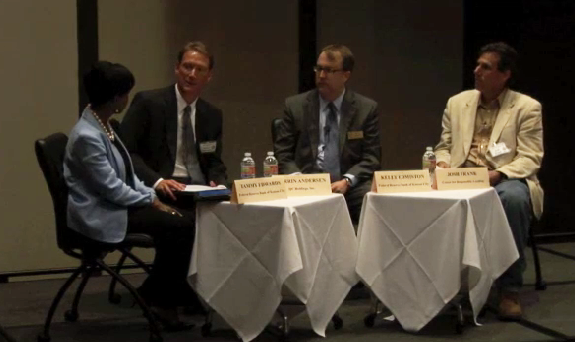Posted on 12 August 2011.
A new study from the Consumer Federation of America says that overdraft protection fees remain high and some institutions actually have slapped on additional penalties. What’s surprising is that this comes a year after the Federal Reserve enacted new rules to rein in exorbitant ODP fees, according to AOL DailyFinance.
“The Fed’s rule cut the number of people who participated in these programs, but for the people who do opt in, there’s no limit on the size of fees or the number of overdraft fees (banks) can charge,” says Ed Mierzwinski, consumer program director with U.S. PIRG.
The median overdraft fee is $35, unchanged from last year, and customers can incur anywhere from three — at JPMorgan Chase (JPM) — to 10 — at Fifth Third Bank (FITB) — of these fees in a single day, according to the study. In the last year, BB&T (BBT) doubled the number of overdraft fees it charges per day to eight, while Regions Financial (RF) raised its daily limit from four to six per day, the survey found. Only TD Bank (TD) reduced the number of fees per day from six to five.
Posted in access to credit, AOL DailyFinance, customers, Federal Reserve
Posted on 28 June 2011.
According to the American Banker, payday lenders have a ‘few friends in high places,’ at least as it relates to the recent KC Fed discussion.
In particular, KC Fed economist Kelly D. Edmiston found evidence that, in states that ban or restrict payday loans, consumers have lower credit scores and make less use of traditional credit.
“I’m arguing that they either lose access to credit, or are using less healthy forms” of short-term borrowing, such as bounced checks, overdraft loans or even illegal loan sharks, says Edmiston.
…
Sharing the debate panel with Frank and with Darrin Anderson, an executive from payday lender QC Holdings, Edmiston defended his research, pointing out that the results were not intended as an argument against bans but as a starting point for discussions on payday loan restrictions, which he says haven’t been examined enough. “The evidence is mixed,” he says with a shrug.
Posted in access to credit, American Banker, best practices, customers, Federal Reserve, industry
Posted on 28 June 2011.

Miss seeing Darrin Andersen late last month before the Kansas City Fed? Not to worry, the Federal Reserve bank uploaded the following videos:
Posted in access to credit, best practices, customers, Federal Reserve, Missouri
Posted on 14 June 2011.
Bankers are hoping to make lemonade after getting served a bunch of lemons with the fight over interchange fees. How are they going to do this? By convincing the Federal Reserve Board to raise its proposed 12-cent cap.
Following quotes attributed to an American Banker article that came out today (subscription required):
“My understanding is that they have taken the comments very seriously in terms of reassigning the numbers and I think the expectation, even though they haven’t formally said it, is that the number is going to be higher than 12 cents,” said Gil Schwartz, a partner at Schwartz & Ballen LLP and a former lawyer for the central bank.
What remains unclear is exactly how high it will go, or what other substantive changes the Fed could make.
“We are expecting some changes, but exactly what they will be and how far they will go; we do not know,” said Karen Thomas, senior executive vice president of government relations and public policy for the Independent Community Bankers of America.
Posted in American Banker, customers, Federal Government, federal legislation, Federal Reserve
Posted on 09 June 2011.
Interchange fees. Interchange fees. A much heated debate that’s been much ado about nothing until today. American Banker reports that after weeks of fierce lobbying by bankers and retailers, the Senate defeated a bill that would have delayed the proposal to cap interchange fees for debit cards.
The bill by Sens. Jon Tester, D-Mont., and Bob Corker, R-Tenn., won only 54 votes — 6 shy of the necessary 60 — while opponents rallied 45 members to their cause. The bill would have forced the Fed to suspend its current rulemaking process and produce a study in six months of the impact of interchange rules. The agency would have had six more months to rework the plan to ensure it did not hurt small banks
Posted in Federal Government, federal legislation, Federal Reserve






